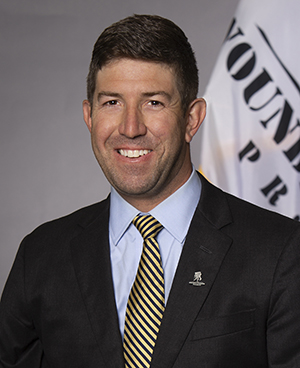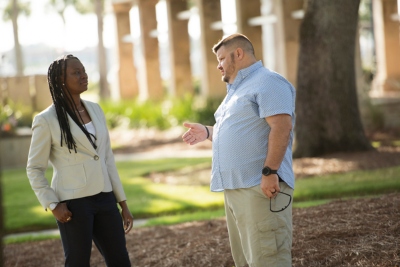Is it Depression? Signs, Symptoms, and Treatment Options for Veterans

Depression affects millions of people each year, but veterans may face an even greater risk due to the unique stressors associated with their military service.
People characterize depression by feelings of sadness and hopelessness. Left untreated, depression can affect daily life and increase the risk of suicide.
Understanding the signs of depression and the treatment options available is critical. Depression is treatable, and veterans do not need to face it alone.
How Many Veterans Live with Depression
According to the National Institute of Mental Health, depression is one of the most common mental health conditions in the U.S.
A study published in the National Library of Medicine noted that depression is a concern for many in the military. Research indicated depression rose to 15% among military members after deployment to Iraq or Afghanistan.
The Warrior Survey* conducted by Wounded Warrior Project® (WWP) found that depression is the third most common self-reported mental health concern among post-9/11 warriors. More than a quarter (35%) of WWP™ warriors said they have moderate to severe depressive symptoms.
Why Depression Affects Veterans
Military experiences can contribute to depression among veterans. Service members often face high-stress situations and trauma while in the military. After leaving the service, signs of depression can grow during the transition to civilian life, when many veterans are dealing with sleep problems, chronic pain, or feeling disconnected from others.
Other factors that can increase a veteran’s risk of developing depression include:
When someone is struggling, it can be very dark and hard to see that there is a path forward... We will walk with them with a flashlight – because everyone deserves the opportunity to heal.
- Traumatic brain injury (TBI)
- Moral injury
- Survivor’s guilt
- Challenges transitioning to civilian life
- Isolation after service
- Co-occurring PTSD or anxiety
If you or a loved one is living with depression, remember that support is out there.
Signs of Depression in Veterans
Everyone's experience with depression is different.
Not everyone will have the same symptoms, but it’s important to recognize the signs and how they affect daily life. Ignoring symptoms can make them worse. Noticing changes in mood, behavior, or habits is the first step toward recovery.
You may benefit from depression therapy or treatment if you're experiencing symptoms like these:
Little or no interest in activities that used to be fun
Have you suddenly lost interest in your hobbies? Do you no longer enjoy time with your friends or loved ones? Have you tried watching a funny movie but felt numb? Depression can take away the joy you usually get from your favorite things.
More irritable and angry, or easily upset
Are you getting upset more often than you have before? Do little things that have not previously bothered you suddenly get under your skin? Maybe you feel like your family is walking on eggshells around you. Depression can make it harder to manage emotions and respond calmly. It's normal to be in a bad mood sometimes, but depression can leave you feeling like you're in a constant cloud of anger.
Hard to concentrate or make decisions

Are you having trouble paying attention at work? Do you forget why you walked into a room? Do you read things but immediately forget what you read? When it's time to make a choice, do you feel stuck or not care? Depression can make it challenging to focus and remember details, significantly affecting daily life. This sometimes makes it hard to maintain a job or care for your family.
Struggling with self-care
Have you stopped showering regularly? What about brushing your teeth, grooming your hair, or even getting dressed for the day? Depression can make basic care feel like a massive chore. This can lead to health issues and struggles with self-esteem that can make depression feel worse.
Ongoing feelings of helplessness
Do you find yourself saying, "What's the point?" Have you given up on ever feeling happy again? Or you may still want happiness, but feel trapped by the current feelings around you. Many people who are depressed start to feel like there’s no light at the end of the tunnel.
Hope is always possible. Explore treatment options to begin feeling like yourself again.
Seeking Help for Depression
Everyone’s journey with depression is unique, and so is the path to healing. Asking for help with mental health is the most important step. While it can feel intimidating, reaching out is a sign of strength – not weakness, says Lyndsay Tkach, mental and brain health services director at WWP.
“With proper support and treatment, one can open doors to hope,” she says.
|
One Warrior's Experience Finding Support After Service  Ryan Kules, a former U.S. Army captain, was severely injured by an improvised explosive device (IED) during a 2005 deployment to Iraq. He lost his right arm and left leg in the blast, as well as two fellow soldiers. For Kules, depression took hold about a year after his injury. “Everything just hit — the severity of my injuries, the responsibility I felt for the deaths of my soldiers, and the loss of purpose,” he recalls. Kules was introduced to Wounded Warrior Project at Walter Reed National Military Medical Center. During his recovery, he participated in several WWP programs, which helped him navigate his emotions. “The support network I had was huge, as was the motivation to seize the second chance at life I had been given," he says. He encourages other veterans to push past barriers and seek support. “It’s not uncommon for the veteran population to be more resistant to getting help. Often, the biggest barrier is the one we create for ourselves, denying the challenge exists.” |
Why treatment for depression matters
Depression is treatable, and getting treatment early can make a difference in building a healthier, more hopeful future.
There are many treatment options for veterans, including medication, psychotherapy, and nonclinical support.
Without care, depression can worsen over time. It can affect work, strain family relationships, and increase the risk of suicide.
“Depression is one of the strongest risk factors for suicide, but it’s also one of the most treatable. When we connect veterans with care early, we save lives,” Tkach says.
Suicide is rarely caused by a single factor — it’s usually the result of several things coming together, whether that’s depression, trauma, substance use, chronic pain, or a major life stressor. Untreated depression intensifies feelings of hopelessness, isolation, and feeling like a burden, all of which are strong predictors of suicidal thoughts.”
Statistics from the VA’s Suicide Report indicate that in 2022, depression affected almost 39% of the veterans who died from suicide.
Treatment is also important since depression can affect others, says Tkach.
“When a veteran struggles with depression, their family often absorbs that stress, too. Loved ones may experience secondary trauma, caregiver burnout, or depression themselves," she says.
"Providing support to veterans and their loved ones builds resilience and strengthens the home environment, which gives veterans the best chance to recover and feel like themselves again.”
How to find the right treatment for depression
Since each person’s experiences and symptoms may differ, their treatment and support must be individualized, too.
“We meet people where they are,” says Tkach. “Many of the calls received at Wounded Warrior Project are from veterans who don’t know what they need. They just know they don’t feel good, they’re not happy, and they want to feel better,” she says.
Through a unique triage process, WWP tries to identify the root cause of an individual’s depression and match them to the programs or support that best suit their needs.
“When someone is struggling, it can be very dark and hard to see that there is a path forward. But we want them to know they are not alone. We will walk with them with a flashlight – because everyone deserves the opportunity to heal,” says Tkach.
How Connection Helps Veterans Overcome Depression

Tkach adds that a key component of support for veterans facing depression is connection.
“[At WWP, our] research tells us that community is one of the strongest protective factors for mental health. Veterans who are connected to others and feel like they belong are less likely to reach a crisis point,” she says.
In addition to Peer Connection events, WWP offers an array of mental health and emotional support programs, as well as resources to address the things that may have led to a veteran’s depression.
“If you lost your job and are worried about finances, for instance, treating depression isn’t going to just take those things away,” says Tkach. “Wounded Warrior Project can help address contributing factors to improve life overall.”
FAQs: Understanding Depression and Its Effects on Veterans
Is it normal to feel depressed after military service?
Many veterans experience sadness, hopelessness, or loss of purpose during or after their transition to civilian life. These feelings may be temporary, but if they persist or interfere with daily life, they could be signs of depression — and support is available.
How can I help a veteran family member who is depressed?
Start with listening. Don’t try to fix everything or downplay their experience. Instead, focus on connection: spend time together, let them know you care, and encourage them to seek support when ready. WWP also offers programs for families and caregivers that provide education, peer support, and resources.
What should I do if I think I have depression but don’t want to talk about it?
It’s common to feel hesitant, but silence can make depression worse. You don’t have to start with a big conversation — you could try writing down your feelings, calling a confidential support line, or talking with a peer you trust. Reaching out, even in small steps, can begin the path toward healing.
What mental health resources are available for veterans with depression?
Veterans can access various resources, from VA services to community-based care. WWP offers many options, including emotional support calls, intensive, inpatient treatment, and other nonclinical resources to build mental resilience and coping skills. WWP also offers supportive programs to address contributing factors to depression.
Can I receive VA benefits for depression?
If your depression is shown to be connected to your service, the Department of Veterans Affairs (VA) can assign a disability rating for depression that ranges from 0% to 100% depending on how much it affects your daily life. Veterans can file a claim and provide medical evidence to support their case. For guidance, WWP’s VA-accredited Benefits Services team can help navigate the process.
Will getting treatment for depression affect my military or VA record?
No. Seeking treatment for depression will not hurt your VA benefits. In fact, documenting your symptoms with a health provider may help if you decide to file a claim in the future. Treatment is about improving your quality of life and should never be mistaken for weakness.
Is there a Veteran Depression Hotline?
Some people may search for a dedicated veterans’ depression hotline, but the Veterans Crisis Line is the official 24/7 support line for veterans. To reach the Crisis Line, call 988, press 1, or text TALK to 838255.
*Warrior Survey, Wave 3 (conducted June 15 - Aug. 24, 2023)
Contact: Cynthia Weiss – Public Relations, cweiss@woundedwarriorproject.org, 904.738.2589
About Wounded Warrior Project
Wounded Warrior Project is our nation’s leading veteran services organization, focused on the total well-being of post-9/11 wounded, ill, or injured veterans. Our programs, advocacy, and awareness efforts help warriors thrive, provide essential lifelines to families and caregivers, and prevent veteran suicides. Learn more about Wounded Warrior Project.



